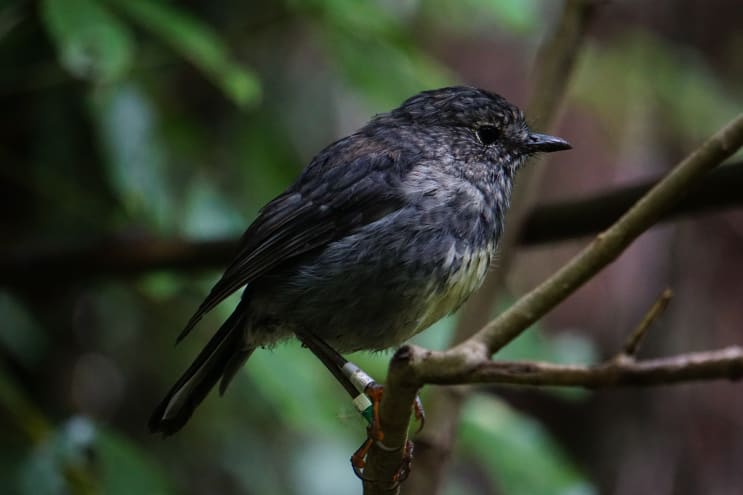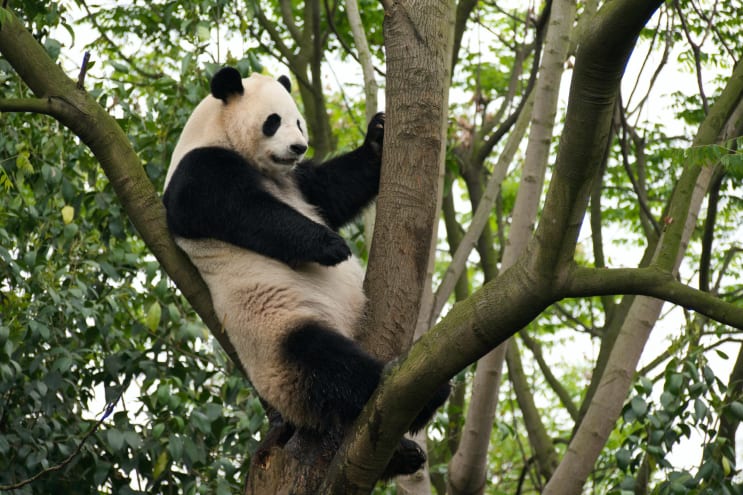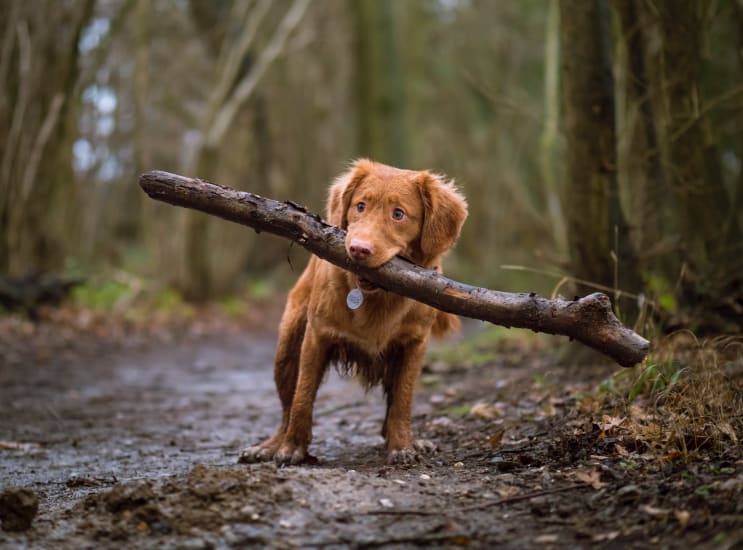What Are Two Careers In Animal Sciences? What Does Each Do?
Sure, animals make corking pets. Just if yous are really passionate about animals, why not consider turning that passion into a career? And hither's the best part: A master`south degree in animal science could open the door to many dissimilar in-demand, loftier-paying and fulfilling jobs. Here's a closer look at six potential career paths yous tin take with a major in animal science.
ane. Conservation officer
Animals and their habitats are inextricably interlinked. In order to protect the former, we must protect the latter. This is where conservation officers come in. These professionals work to manage, protect, and better areas of ecology importance in many different ways, ranging from hands-on conversation work, publicity, and scientific monitoring. They are also employed by many unlike kinds of organizations, including charities, local authorities, wildlife trusts, government organizations, conservation groups and more.
And while working in the field is one way to go, at that place are also enough of options for the office-inclined. As Main Conservation Officer of the San Diego Zoo, Dr. Allison Alberts is responsible for managing ongoing endangered species conservation efforts at both the zoo and field sites in 35 countries.
Alberts told JobShadow.com of the scope of her role, "I direct a staff of 200 scientists and researchers who are currently working on more than 100 projects locally and globally, and administer an annual upkeep of over $15 million dollars. I am responsible for setting the overall strategic management of our piece of work and determining priorities for how we allocate our time and resources. In addition to overseeing a wide multifariousness of conservation initiatives, I am involved in helping raise funds to support wildlife research and awareness of the issues facing endangered species today."
The work is enervating, but besides uniquely fulfilling. "1 of the virtually rewarding aspects of my job is getting to see species and individual animals that we have worked with for many years in zoos go reintroduced back into the wild. It is a special experience to release an fauna into its native habitat, hoping it will successfully integrate into the wild population and go a functional part of the ecosystem," Alberts adds.
I last thing to keep in listen if you're considering a career in conservation? While a caste in creature science, biology, zoology, ecology or a related field is critical, volunteer feel with a zoo or other consideration group can give you an inside border.

two. Academia
Animal scientists working in academia "conduct inquiry in the genetics, nutrition, reproduction, growth, and development of domestic farm animals," says the US Agency of Labor Statistics. They may also exist responsible for instruction undergraduate and graduate students, supervising student lab workers, and conducting and publishing their own research.
Professor of animal scientific discipline Temple Grandin, made famous by the eponymous, honour-winning movie of the same proper noun starring Claire Danes, is credited with revolutionizing practices for the humane handling of cattle. Grandin told The Washington Post of her outlook, "I feel very strongly that we've got to requite animals a good life. None of those cattle would accept lived if it wasn't for usa. We bred those cattle, and since we bred those cattle, we owe them a decent life."

iii. Veterinarian medicine
Veterinary medicine is 1 of the traditional careers pursued by animal science majors. It requires a doctorate in veterinary medicine in addition to postsecondary coursework in chemistry, biological science, zoology, physiology, microbiology, and beefcake.
While veterinary piece of work is challenging, information technology likewise comes with many intangible rewards, according to Veterinary Exercise News . These include receiving love and gratitude from pets and their owners; using all of your senses to perform your job; enjoying working in a circuitous environment; valuing and respecting the profession'south ethical responsibilities; thriving at overcoming challenges; lifelong learning; and the development of stress management skills.
"In veterinary medicine you've got to do two things: you treat the animal, and and then y'all've got to use psychology on the owner. Every mean solar day I put up with people like that. And I make the joke that one end of the leash is easy to deal with. The other end of the leash is very difficult to bargain with. If a person tin't bargain with these individuals that are very demanding, that read the net also much, that remember they know everything, if you can't look by those people, and, bite your tongue at times, you won't get very far," reveals one vet in an interview with JobShadow.com.

4. The nutrient industry
In a roundup of non-traditional career pathways for animal science students shared past the American Society of Animal Science, the food manufacture -- in the form of global nutrition research -- is highlighted.
Sylvia P. Poulos, PhD, RD/LD, a scientist with The Coca-Cola Company with a PhD in foods and nutrition, reveals that her role is to "place and evaluate potential ingredients and delivery of technologies to improve the health and wellness of consumers." Her duties include coming together suppliers and scientists, conducting literature reviews, developing product and protocepts, conducting preclinical evaluations, and planning and sponsoring clinical trials. She also collaborates locally and globally with other scientists, regulatory groups, production developers, claims substantiation groups, purchasing, legal, marketing and brand divisions.
And while people with backgrounds in many different scientific fields are useful to nutrient companies, people with backgrounds in animal sciences offer unique value, asserts Poulos. These strengths include a basic understanding of various scientific and agricultural fields, such every bit soils, crops, genetics, molecular biology and more, as well every bit knowledge of the animal product process comprising breeding and genetics, reproduction, growth, feeds and environment, raw products, and consumer products.

v. Zoology
"Zoologists study animals and their interactions with ecosystems. They study their physical characteristics, diets, behaviors, and the impacts humans take on them. They written report all kinds of animals, both in their natural habitats and in captivity in zoos and aquariums," explains EnvironmentalScience.org. This piece of work is pivotal given the many threats facing us equally humans today. "Their knowledge is disquisitional to preserving of import habitats and managing wildlife'south adaptations to climatic change," the website adds.
While duties vary depending on the job, typical zoologist responsibilities may include:
- Analyzing the lifecycle of animals and their functions in the ecosystem
- Conducting population assessments of species
- Collecting, processing, and preparing specimens for study
- Analyzing information and experimental observations and evaluating report results
- Conducting and overseeing wildlife population surveys
- Providing technical expertise on wildlife survey blueprint
- Preparing wildlife management plans
- Monitoring trends in wildlife populations.
Because of the inherently diverse nature of their work, zoologists work in a breadth and depth of settings, including zoos, wild fauna centers, wildlife parks, and aquariums, where they are responsible for the care of animals, their distribution, and their enclosures. They also piece of work in conservation, at museums, in inquiry, and in offices and laboratories.
And while competition is fierce for zoology jobs, the work is extraordinary for those who prevail -- specially if the profession is your calling. Zoologist Justin Gerlack told the Journal of Young Investigators, "I was always interested in the world effectually me, with a babyhood obsession with animals that never left me. I can't remember a time when I didn't want to be a zoologist." His advice to those considering following in his footsteps? "Don't call back too much almost what is 'useful,' as everything is connected in science and then whatever you lot do will give you a useful perspective. I call up y'all should follow your interests."

half dozen. Fauna trainer for films and productions
If a job on a movie ready sounds like the perfect way to combine your dearest of animals with an interest in the picture industry, training animals for films and productions might be a viable choice. Earlier choosing this road there are some things you should know, however. First, animal training is not an easy profession to suspension into, and when y'all do, there are very few jobs -- and fewer by the mean solar day given that digital technology is more than frequently used instead of live animals. That means the competition for these jobs is also growing.
Secondly, information technology's non all glitz and glamour: picture creature trainers frequently piece of work long hours in difficult conditions, and the training process takes a lot of dedication and patience. And it'due south more than just pedagogy an creature to perform or complete specific tasks. Good animal trainers volition need to exist aware of laws and regulations surrounding animal care and welfare. They must have safety at the forefront of their minds - the safety of the animal, the people interacting with the animal, and their own. They need to sympathize animal beliefs and be able to communicate the capabilities - and limitations - of specific breeds or species to producers and industry managers who may have unrealistic expectations.
In fact, a lot of the work that animal trainers for film do is with humans. Julie Tottman, a UK-based animate being trainer who has worked on large projects like the Harry Potter films and Game of Thrones, told Refinery 29 that films where the actors frequently interact with the animals "require extensive one-on-ane work." Animal trainers will ofttimes work with the actors to help them bail with or overcome their fear of an brute costar. And trainers have to establish directions and rules for creature interaction.

These six careers are only the start when it comes to what you tin do with an animal science caste. From wildlife rehabilitation to biotechnology, a passion for animals and sciences adds up to many exciting opportunities.
Source: https://www.masterstudies.com/article/six-careers-for-animal-science-majors/
Posted by: carmonaoffirest1957.blogspot.com

0 Response to "What Are Two Careers In Animal Sciences? What Does Each Do?"
Post a Comment